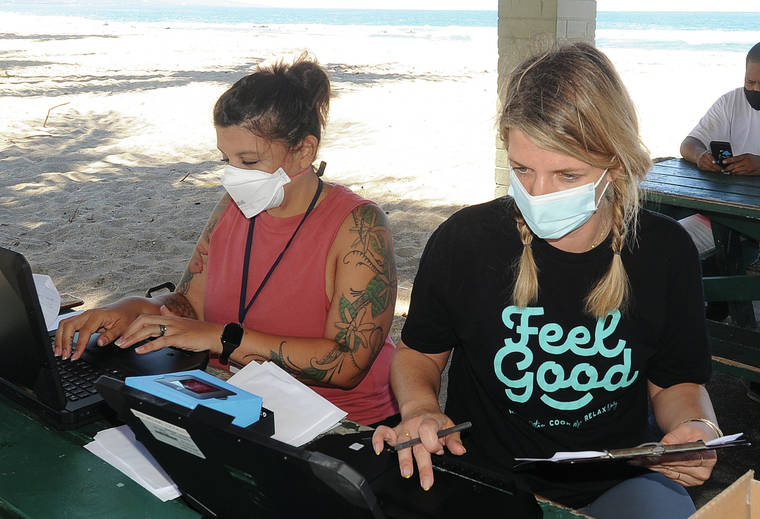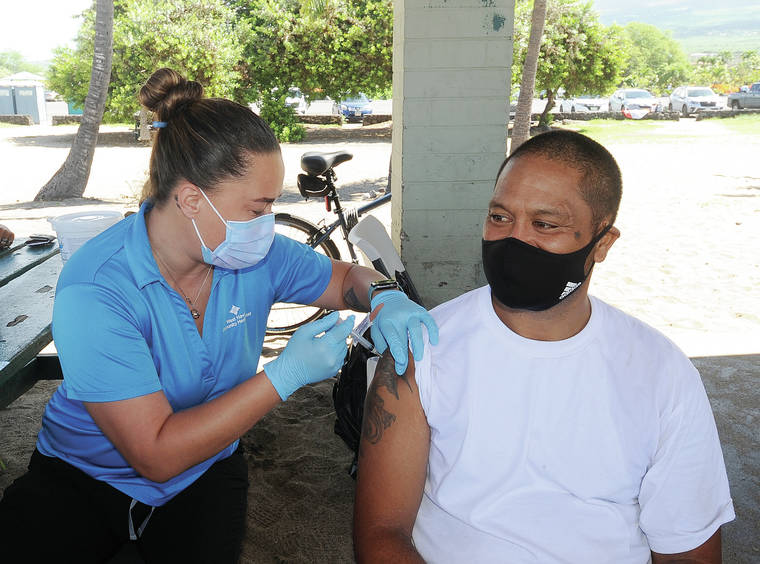Set up in a pavilion on the beach at Old Kona Airport Park Thursday morning, West Hawaii Community Health Center (WHCHC) staff welcomed homeless individuals taking part in the latest effort to vaccinate the community.
With boots on the ground, WHCHC medical staff performed their monthly outreach within the homeless encampments from Honokohau Harbor to Alii Drive providing wound care, distributing hygiene packs and food and offering education about COVID. On Thursday, they were also encouraging individuals to get the free vaccine.
Ten individuals took advantage of the clinic and $25 KTA Super Stores gift card incentive, bringing WHCHC houseless vaccination outreach number to 47.
“COVID has shifted how we do outreach,” said Emily Crabill, WHCHC Marketing and Development Manager. “We are trying to educate and dispel the myths about COVID and the vaccine so people can make informed choices.”
She said most of the homeless they encounter are well informed about the virus, but as with the general population, there are doubters and conspiracy theorists. However, they are realizing the seriousness of COVID as they start to see friends getting sick.
Crabill also noted several new encampments they have encountered over the course of the pandemic and lots of new faces.
“It’s constantly changing,” she said.
Linda Thomas-Vandervoort is a community volunteer who works with and advocates for the homeless population in West Hawaii. For the past week she has been making the rounds at Old Kona Airport Park trying to convince the unsheltered to get the vaccine.
“I have been talking with them all week answering questions and dispelling myths. I ask them what makes them hesitant about getting the vaccine,” she said. “There is a lot of vaccine hesitancy and trust issues. The homeless generally already have trust issues with the government.”
She was able to get a handful of individuals agree to get the vaccine.
On Thursday, Thomas-Vandervoort was transporting people to the pavilion to get their shot. She said they came for a variety of reasons.
“Some knew it was the right thing to do, others were there for the gift certificate,” she said.
Thomas-Vandervoort said testing in the unsheltered community is lagging because in order to get tested, an individual needs an ID, which many homeless do not have. A special pop up testing clinic for the homeless is only held once every three weeks.
Another reason Thomas-Vandervoort said the homeless have low numbers of vaccinations and testing is they did not see the spread happen in the first wave of COVID.
“A lot had a false sense of security because the first wave didn’t affect them,” she said. “They didn’t think they could get it because they were outdoors.”
Jason Dela Cruz, acting district health officer for Hawaii County said isolation and quarantine sites that were discontinued in the end of July will shortly resume. He said the biggest challenge the DOH is facing while reaching out to COVID positive patients is getting ahold of them. He said in the last week of July only 62% of positive cases were contacted. The remainder either wouldn’t answer the phone, refused to speak to them or they provided a wrong number when tested.
“If you don’t answer the phone, we can’t help you,” he said.
Dela Cruz also advised the community have a plan in place in case you test positive for the virus; supply of food and medicine and a place to quarantine or isolate.
“You have a plan for a hurricane. Have a plan if you are positive,” he said.


